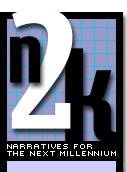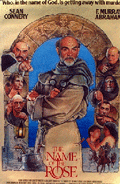

|
The Return of the Middle Ages
1. The M. A. as a pre-text...There's a difference between historical novels and cloak-and-dagger stuff. The former choose a particular historical period so as to gain a better understanding not only of that period but (through it) of our present time, seen as the end result of those remote historical events.The characters of the novel need not be "really historical" (that is, people who really existed); it is enough for them (albeit fictional) to be representative of their period...Thus in historical novels fictional characters help one to understand the past (and the past is not taken as a pretext)... 2. The M. A. as the site of an ironical revisitation...as the characters in Monty Python movies do not believe in the grotesque period they inhabit. 3. The M. A. as a barbaric age, a land of elementary and outlaw feelings... 4. The M. A. of Romanticism, with their stormy castles and their ghosts... 5. The M.A. of the philosophia perennis or of neo-Thomism...as a transparent source of inspiration, behind many kinds of formal and logical thinking in contemporary and secular philosophers... 6 The M.A. of national identities... 7. The M.A. of Decadentism. Think, obviously, of the Pre-Raphaelite Brotherhood, think of Ruskin...a lot of fakes, sometimes interesting and sometimes pathetic, in Italian cities... 8. The M.A. of philological reconstruction, which goes from Mabillon to Muratori up to the best of Gilson...Not fully free from the curiosity of the mass media, these M.A. help us, nevertheless, to criticize all the other M.A. that at one time or another arouse our enthusiasm... 9. The M.A. of the so-called Tradition, or of occult philosophy...an eternal and rather ramshackle structure, swarming with knights Templars, Rosicrucians, alchemists, Masonic initiates, neo-Kabbalists, drunk on reactionary poisons sipped from the Grail, ready to hail every neo-fascist Will to Power, eager to accept as a visual ersatz for their improbable visions all the paraphernalia of the M.A. n. 3...Antiscientific by definition, these M.A. keep going under the banner of the mystical weddings of the micro- with the macro-cosm, and as a result they convince their adepts that everything is the same and that the whole world is born to convey...the same Message. Fortunately the message got lost...The model of post hoc ergo propter hoc is reversed into propter hoc ergo ante hoc... 10. Last, very last, but not least, the expectation of the Millennium... Which One?...To say openly which of the above ten types we are referring to means to say who we are and what we dream of, if we are simply practicing a more or less honest form of divertissement, if we are wondering about our basic problems or if we are supporting, perhaps without realizing it, some new reactionary plot. (Umberto Eco, "Dreaming the Middle Ages," Travels in Hyperreality, transl. by W. Weaver, NY: Harcourt Brace, 1986, 61-72) |
 ...we are at present witnessing, both in Europe and America, a
period of renewed interest in the Middle Ages, with a curious
oscillation between fantastic neomedievalism and responsible philological
examination...one must wonder why Americans are more or less experiencing
the same obsession as Europeans...We are dreaming of the Middle
Ages, some say. But in fact both Americans and Europeans are
inheritors of the Western legacy, and all the problems of the
Western world emerged in the Middle Ages: Modern languages, merchant
cities, capitalistic economy (along with banks, check and prime
rate)...the rise of the modern armies, of the modern concept of
the national state, as well as the idea of a supernational federation
(under the banner of a German Emperor elected by a Diet that functioned
like an electoral convention); the struggle between the poor and
the rich, the concept of heresy or ideological deviation, even
our contemporary concept of love as a devastating unhappy happiness...We
are still living under the banner of medieval technology. For
instance, eyeglasses were a medieval invention...At that time,
an intellectual who became farsighted at the age of forty (bear
in mind the difficulty of reading unreadable manuscripts by torchlight
in dark rooms beneath shadowy vaults) was unable to produce actively
after the age of fifty. With the introduction of eyeglasses intellectual
productivity increased enormously and the following centuries
could better exploit these human resources. Thus looking at the
Middle Ages means looking at our infancy...Our return to the Middle
Ages is a quest for our roots...the Middle Ages have never been
reconstructed from scratch: We have always mended or patched them
up, as something in which we still live. We have cobbled up the
bank, as well as the cathedral, the state as well as the church.
We no longer dwell in the Parthenon, but we still walk or pray
in the naves of the cathedral. Even when we live with Aristotle
or Plato, we deal with them in the same terms suggested by our
medieval ancestors..So I'll try to outline at least ten types
of the Middle Ages, to warn readers that every time one speaks
of a dream of the M.A., one should first asks which M.A. one is
dreaming of:
...we are at present witnessing, both in Europe and America, a
period of renewed interest in the Middle Ages, with a curious
oscillation between fantastic neomedievalism and responsible philological
examination...one must wonder why Americans are more or less experiencing
the same obsession as Europeans...We are dreaming of the Middle
Ages, some say. But in fact both Americans and Europeans are
inheritors of the Western legacy, and all the problems of the
Western world emerged in the Middle Ages: Modern languages, merchant
cities, capitalistic economy (along with banks, check and prime
rate)...the rise of the modern armies, of the modern concept of
the national state, as well as the idea of a supernational federation
(under the banner of a German Emperor elected by a Diet that functioned
like an electoral convention); the struggle between the poor and
the rich, the concept of heresy or ideological deviation, even
our contemporary concept of love as a devastating unhappy happiness...We
are still living under the banner of medieval technology. For
instance, eyeglasses were a medieval invention...At that time,
an intellectual who became farsighted at the age of forty (bear
in mind the difficulty of reading unreadable manuscripts by torchlight
in dark rooms beneath shadowy vaults) was unable to produce actively
after the age of fifty. With the introduction of eyeglasses intellectual
productivity increased enormously and the following centuries
could better exploit these human resources. Thus looking at the
Middle Ages means looking at our infancy...Our return to the Middle
Ages is a quest for our roots...the Middle Ages have never been
reconstructed from scratch: We have always mended or patched them
up, as something in which we still live. We have cobbled up the
bank, as well as the cathedral, the state as well as the church.
We no longer dwell in the Parthenon, but we still walk or pray
in the naves of the cathedral. Even when we live with Aristotle
or Plato, we deal with them in the same terms suggested by our
medieval ancestors..So I'll try to outline at least ten types
of the Middle Ages, to warn readers that every time one speaks
of a dream of the M.A., one should first asks which M.A. one is
dreaming of: